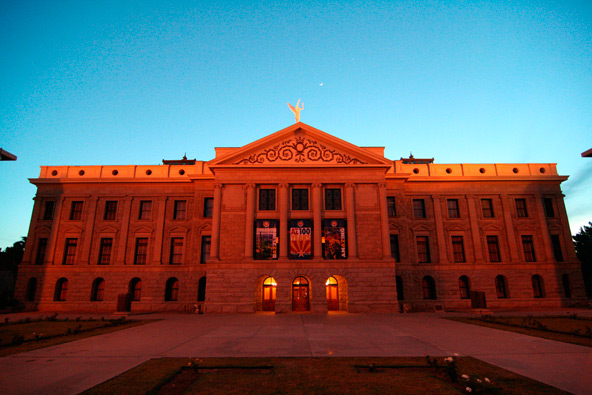
The 9th U.S. Circuit Court of Appeals has struck down an Arizona law banning abortions after 20 weeks.
The Mother’s Health and Safety Act, passed by the Arizona Legislature and signed by Gov. Jan Brewer in 2012, was originally upheld by a federal judge but subsequently challenged.
In August, a three-judge panel of the 9th circuit blocked the law, just hours before it was set to take effect.
On May 21, the 9th circuit ruled that Arizona’s ban on abortions after 20 weeks violated key provisions of Roe v. Wade, the Supreme Court decision that legalized abortion in 1973.
Ron Johnson, executive director of the Arizona Catholic Conference, said the court’s ruling was not a surprise.
“It was expected but sad nonetheless,” Johnson said. “We’ve always thought that the Supreme Court will have the final word on this matter.”
John Jakubczyk, a Phoenix attorney and past president of Arizona Right to Life, said the court’s decision was consistent with what he termed its “pro-abortion attitude and history of overturning laws that are reasonable.”
“Anytime you’re challenging the status quo … anytime you’re asking the court to think rather than react — it’s fraught with danger,” Jakubczyk said, “especially when you’re talking about abortion.”
The ruling from the 9th circuit, based in San Francisco, applies only to the nine states within its jurisdiction, which also includes Guam and the Northern Mariana Islands. One of the states, Idaho, has a similar law restricting late-term abortions.
Jakubczyk said that the U.S. District Court for the District of Arizona could rule differently on the matter of laws restricting late-term abortions.
“If that happens, then you have a conflict,” Jakubczyk told the Catholic Sun, newspaper of the Phoenix Diocese. “We want to challenge Roe so we can take it to the Supreme Court and we say, ‘Why can’t we protect babies at 20 weeks?’ There’s nothing to lose by appealing.”
Jinny Perron, vice president of the East Valley Pro-Life Alliance, said she was disappointed by the 9th circuit’s ruling but not surprised.
“This particular court has a long history of doing this and we look forward to the Supreme Court possibly upholding its legality here in Arizona,” Perron said. “It is devastating to have an abortion after 20 weeks — the baby is already 5 months old and can feel pain and it’s not good for the mother.”
Perron encouraged pro-lifers to keep a positive attitude.
“We go forward two steps and back 20,” Perron said. “It’s just constant, but you know what? We know we’ve won the battle. We have to have faith, we have to pray and we have to trust in God because he is in control.”
Jakubczyk said the ruling striking down Arizona’s law failed to recognize the mistakes wrought by Roe.
“The 9th circuit should have had the courage to say that Roe allowed for the killing of unborn children at a time when people did not wish to recognize the humanity of the unborn child,” Jakubczyk said. As technology provides a clearer window to the womb, that’s getting tougher to ignore, he said.
“Roe talked about a woman having a right to an abortion,” Jakubczyk said. “Her right to an abortion can happen a whole lot sooner under the (Arizona) law. Therefore, the court should uphold (Arizona’s ban) but they didn’t want to do that because they want abortion legal for the entire nine months.”
“Viability is part of the issue but even that question gets fuzzier and fuzzier as we see that line getting pushed further and further back,” Johnson said.
Viability, the point at which a baby can survive outside the mother’s womb, has been pushed to 24 weeks in recent years. At 20 weeks — the point at which the Arizona law banned abortions — there’s not much chance of survival outside the womb.






